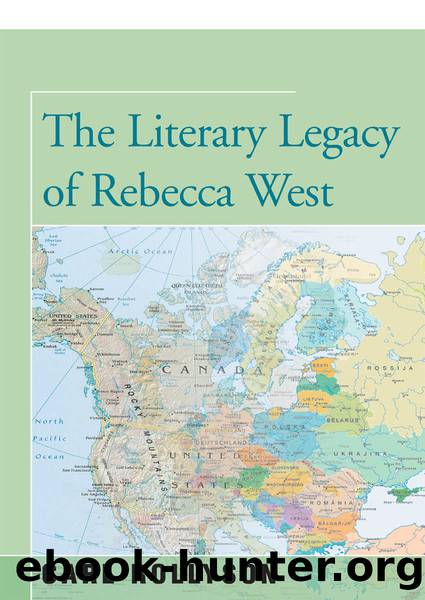The Literary Legacy of Rebecca West by Rollyson Carl;

Author:Rollyson, Carl; [Rollyson Carl]
Language: eng
Format: epub
Publisher: Open Road Integrated Media, Inc.
Published: 2016-05-17T00:00:00+00:00
CHAPTER SIX
1936â1941
After The Thinking Reed, West did not publish another novel for twenty years. She did not stop thinking of herself as a novelist, and she began a new novel in 1941, but journalism beckoned because the âworld was changing. Heavens how quickly, how dramatically, how drastically ⦠Can you blame me if I ran about the world watching it cast its old skin and put on the new?â she asked her readers. But this traveling troubled her. She would return home with the âpressing conviction that quite soon people would not read novels because human beings would have forgotten how to read, as part of a general amnesia that would leave them with no memories except perhaps the technique for shooting arrows.â
The world was going to hell. Moreover, her faith in fiction weakened when it âtook a turn which I could not approve.â It seemed on its way to obsolescence to her. Except for Orlando, she found most of Virginiaâs Woolfâs work âpainted with gentility; a clutch at intellectual privilege on the ground of specially delicate perceptions.â Of course, there were novelists she admiredâsuch as Henry Greenâbut they did not have a lasting influence, and the environment for her kind of fiction seemed forbidding.
In her youth, she had looked forward to writing ânovel after novel.â But in her case, novels did not come easily, since each one had to be a product of an imagination that yoked history and psychology, the individual and societyânot an easy union to achieve or to understand, as the writing and critical reception of The Thinking Reed proved.
In the spring of 1936, West accepted an invitation from the British Council to lecture in Yugoslavia. She had just abandoned a projected book on Finland, a âbeautiful example of a small nation threatened by the great powersâ struggling for independence. The grammar and pronunciation of Finnish had defeated her. Serbo-Croatian, though a difficult language, yielded to her dogged study, though she would never become fluent in the language and traveled the country with a dictionary in her lap. More importantly, she discovered in Yugoslavia the source of everything that had driven her to become a writer. In March 1937, she would return to the country with Henry Andrews, and again alone in the spring of 1938âeach time expanding her notion of the travel book, Black Lamb and Grey Falcon, that would work an irrevocable change in her life and career.
When the book appeared in America (1941) and in England (1942), it was addressed to a world at war. Indeed, Westâs four-year labor on Black Lamb and Grey Falcon occurred as she despaired over the Western democracies refusal to check the spread of fascism and her certainty that war was inevitable. She had argued against the pacifists in England throughout the 1930s, giving her support to the Spanish Republic when it was attacked by Franco. Her husband had lost his job at Schroders when he refused to support the firmâs collaboration with Nazi policies, and he had risked his life to spirit Jews out of Germany.
Download
This site does not store any files on its server. We only index and link to content provided by other sites. Please contact the content providers to delete copyright contents if any and email us, we'll remove relevant links or contents immediately.
The Power of Myth by Joseph Campbell & Bill Moyers(698)
Four Shakespearean Period Pieces by Margreta de Grazia(698)
A Social History of the Media by Peter Burke & Peter Burke(645)
Inseparable by Emma Donoghue(617)
The Complete Correspondence 1928-1940 by Theodor W. Adorno & Walter Benjamin(517)
Bodies from the Library 3 by Tony Medawar(489)
The Spike by Mark Humphries;(478)
A Theory of Narrative Drawing by Simon Grennan(474)
Culture by Terry Eagleton(470)
World Philology by(459)
Ideology by Eagleton Terry;(456)
Farnsworth's Classical English Rhetoric by Ward Farnsworth(449)
A Reader’s Companion to J. D. Salinger’s The Catcher in the Rye by Peter Beidler(435)
Adam Smith by Jonathan Conlin(427)
Comic Genius: Portraits of Funny People by(415)
Game of Thrones and Philosophy by William Irwin(405)
Monkey King by Wu Cheng'en(405)
High Albania by M. Edith Durham(401)
Early Departures by Justin A. Reynolds(386)
